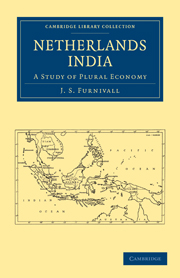Book contents
- Frontmatter
- INTRODUCTION
- Contents
- TERRITORIAL DIVISIONS
- NETHERLANDS INDIA
- AUTHOR'S PREFACE
- LIST OF GENERAL REFERENCES
- GLOSSARY
- MEASURES AND CURRENCY
- THE MALAY ARCHIPELAGO, IN COMPARISON WITH EUROPE
- Chapter I INDONESIA, TO 1600
- Chapter II THE EAST INDIA COMPANY, 1600–1800
- Chapter III THE YEARS OF CONFUSION, 1795–1815
- Chapter IV THE YEARS OF UNCERTAINTY, 1815–1830
- Chapter V THE CULTURE SYSTEM, 1830–1850
- Chapter VI THE TRANSITION TO LIBERALISM, 1850–1870
- Chapter VII LIBERALISM, 1870–190
- Chapter VIII EFFICIENCY, WELFARE AND AUTONOMY
- Chapter IX ADMINISTRATIVE AND POLITICAL REFORMS
- Chapter X ECONOMIC PROGRESS
- Chapter XI SOCIAL ECONOMY
- Chapter XII SOME EFFECTS OF THE CRISIS OF 1929
- Chapter XIII PLURAL ECONOMY
- INDEX OF REFERENCES
- GENERAL INDEX
Chapter IV - THE YEARS OF UNCERTAINTY, 1815–1830
Published online by Cambridge University Press: 07 September 2010
- Frontmatter
- INTRODUCTION
- Contents
- TERRITORIAL DIVISIONS
- NETHERLANDS INDIA
- AUTHOR'S PREFACE
- LIST OF GENERAL REFERENCES
- GLOSSARY
- MEASURES AND CURRENCY
- THE MALAY ARCHIPELAGO, IN COMPARISON WITH EUROPE
- Chapter I INDONESIA, TO 1600
- Chapter II THE EAST INDIA COMPANY, 1600–1800
- Chapter III THE YEARS OF CONFUSION, 1795–1815
- Chapter IV THE YEARS OF UNCERTAINTY, 1815–1830
- Chapter V THE CULTURE SYSTEM, 1830–1850
- Chapter VI THE TRANSITION TO LIBERALISM, 1850–1870
- Chapter VII LIBERALISM, 1870–190
- Chapter VIII EFFICIENCY, WELFARE AND AUTONOMY
- Chapter IX ADMINISTRATIVE AND POLITICAL REFORMS
- Chapter X ECONOMIC PROGRESS
- Chapter XI SOCIAL ECONOMY
- Chapter XII SOME EFFECTS OF THE CRISIS OF 1929
- Chapter XIII PLURAL ECONOMY
- INDEX OF REFERENCES
- GENERAL INDEX
Summary
1. The Dutch in 1815. When Napoleon fell the Dutch were no longer a race of heroes such as had founded the United Provinces and the colonial empire. It was not merely that two hundred years of easy living had sapped their vitality; the whole social machinery of political and economic life had cramped their initiative and narrowed their outlook and then, in 1795, quite suddenly collapsed. The body politic was broken. During the next twenty years the rough surgery of their friends and allies, France and England, broke their spirit.
It was the Dutch people and not the French troops which swept away the old Republic of the United Provinces, and its downfall occasioned no outburst of popular feeling which might serve for a basis of reunion; then the rapid succession of constitutions obliterated the ancient privileges and historic parties, and from 1810 the country was annexed to France with the centre of its political life in Paris. The annexation achieved one positive result; it transmuted the mortal remains of the old Union into the raw material of a nation. But this was without form and life. The Dutch had assisted in their own undoing and were contented with their fate. Here and there a few hotheaded youths might give some trouble to the local police; more often a tavern group would raise their voices and their tankards in a patriotic chorus; but, even after the defeat of Napoleon at Leipzig, the people did not stir, and, when the French troops were withdrawn from Amsterdam, the inhabitants could find no better way to celebrate their new liberty than by tearing down a few French eagles.
- Type
- Chapter
- Information
- Netherlands IndiaA Study of Plural Economy, pp. 80 - 114Publisher: Cambridge University PressPrint publication year: 2010First published in: 1939



